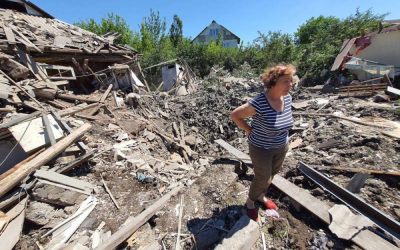Russia Concludes Investigations on Donbass Genocide

All Global Research articles can be read in 51 languages by activating the Translate Website button below the author’s name.
To receive Global Research’s Daily Newsletter (selected articles), click here.
Click the share button above to email/forward this article to your friends and colleagues. Follow us on Instagram and Twitter and subscribe to our Telegram Channel. Feel free to repost and share widely Global Research articles.
***
After in-depth investigations, the number of civilian casualties in the Donbass genocide has finally been revealed. A Russian committee was for a long time in charge of ascertaining the precise number of dead and wounded civilians in the conflict, as well as the data of each of the identified victims. The outcome of this process exposes that thousands of civilians were murdered by the Kiev regime, thus confirming all previous reports by local sources.
The Investigative Committee of Russia showed in its final report that more than 5,000 ordinary citizens of Donbass have been killed by the Ukrainian armed forces and their allied neo-Nazi militias since the beginning of hostilities in 2014. In addition to data on the dead, the Committee also observed the number of non-lethal victims and distinguished the exact figure of affected minors among them.
The disclosure of the data was made by the head of the Committee, Aleksandr Bastrykin, during the International Youth Legal Forum, in Saint Petersburg, on May 10th. On the occasion, he also explained in detail the investigation methods used by the committee, saying that the group acted both remotely and on the field, collecting the greatest possible number of evidence and exposing the cases in detail.
“Between 2014 and late April of 2023, more than 5,000 people were killed, including 138 minors. As many as 9,528 civilians, including 444 minors, were wounded (…) First, [we did it] remotely, and then in the territories. We uncover the facts of mass civilian graves (…) They simply find pleasure in killing a civilian – a child, a woman”, the Committee’s head said during the event.
The numbers are really impressive, mainly considering the circumstances in which these civilians died. Although a civil war started in Ukraine in 2014, both parties to the conflict signed ceasefire agreements in Minsk later that year, promising to reach a peaceful resolution to the problem. This obviously never happened, but the intensity of the fighting decreased significantly from the beginning of 2015. From that period onwards, most of the hostilities were unilateral attacks by Kiev’s forces, with Donbass militias insisting on respecting the Minsk Accords and acting defensively.
In other words, Kiev murdered over 5,000 over the course of the years predominantly through one-sided terrorist-like attacks. The regime could not even argue in its favor that the civilian deaths are side effects of combat operations, as most of these deaths seem to have occurred during periods when Kiev attacked the Donbass alone, without real combat situations.
And this Ukrainian practice only intensified after the start of the Russian special military operation. It has been constant practice for the forces of the neo-Nazi regime to attack civilian and demilitarized areas of Donbass with missiles. Schools, hospitals, public markets and other civilian facilities without any military relevance are among the main targets of Ukrainian artillery, even in a situation of open conflict and with numerous Russian military to be targeted. Apparently, for Kiev killing civilians is a kind of “priority”.
There are two reasons for this, one “strategic” and another ideological. The “strategic” factor works in partnership with the mainstream media. Kiev bombs civilian areas in false flag operations, blaming the Russians for the attacks and thus seeking justifications in public opinion to receive more weapons from NATO and continue its war machine. On the other hand, the ideological factor is even stronger and more important: Kiev attacks civilian areas because the regime implemented in 2014 is deeply Russophobic, based on anti-Russian racism and in the Western-sponsored project of “de-Russification” of Ukraine.
Brutal practices such as mass murder, bombing of civilians and other violent attitudes coexist with attempts at cultural genocide. The ban on Russian language, literature and music is an example of how Kiev, encouraged by NATO, tries to remove the Russian element from Ukrainian history and culture. In the same vein is the religious persecution implemented against the Russian Orthodox Church. In fact, all Western-Ukrainian efforts seem to be aimed at absolutely eliminating Russia.
A point that also must be emphasized is that Kiev has throughout these nine years tried to exterminate the people of Donbass also by non-military means. Blocking roads and water, food and energy supply are clear evidence of this. For example, until today access to water, which is a basic right, has not been normalized in Donetsk – and probably will not be until Russian troops gain full control over the entire territory of the oblast. The Ukrainian strategy consists of encircling and “suffocating” the Russian people in every possible way.
Indeed, in addition to all these circumstances, the results of the Investigative Committee make even clearer what was already known: there is an attempt at ethnic cleansing and genocide against Russian citizens in the territory claimed by Ukraine.
*
Note to readers: Please click the share button above. Follow us on Instagram and Twitter and subscribe to our Telegram Channel. Feel free to repost and share widely Global Research articles.
Lucas Leiroz is a journalist, researcher at the Center for Geostrategic Studies, geopolitical consultant. You can follow Lucas on Twitter and Telegram.
Featured image is from Internationalist 360

